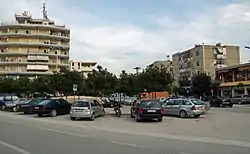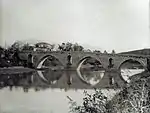Dimal, Albania
Dimal is a municipality in Berat County, central Albania. It was formed at the 2015 local government reform by the merger of the former municipalities Cukalat, Kutalli, Poshnjë and Ura Vajgurore, that became municipal units. The seat of the municipality is the town Ura Vajgurore.[1] The total population is 27,295 (2011 census),[2] in a total area of 156.65 km2.[3] The population of the former municipality at the 2011 census was 7,232.[2]
Dimal | |
|---|---|
 City Center of Dimal | |
 Emblem | |
 Dimal | |
| Coordinates: 40°46′N 19°53′E | |
| Country | |
| County | Berat |
| Government | |
| • Mayor | Juliana Memaj (PS) |
| Area | |
| • Municipality | 156.65 km2 (60.48 sq mi) |
| Population (2011) | |
| • Municipality | 27,295 |
| • Municipality density | 170/km2 (450/sq mi) |
| • Municipal unit | 7,232 |
| Time zone | UTC+1 (CET) |
| • Summer (DST) | UTC+2 (CEST) |
| Postal Code | 5007 |
| Area Code | (0)361 |
| Website | Official Website |
History

Ruins in the style of the old Gorica bridge in Berat attest to the existence of early inhabitants and what would later become the town today. The contemporary city has its origins in recent displacements of residents from nearby villages over the last 100 years. The building of bridges has been the mark of continuity in the town's history. Known by various names, such as "Bridge of Hasan Bey," the contemporary name comes from a cement and iron bridge believed to have been built by the Italians as infrastructure for oil pipelines that connected Kuçovë with Vlorë. Local residents call it the "Old Bridge." Today it is a small town, known as a crossroad between Berat and Kuçovë.
Geography
The town is situated on both banks of the river Osum, at the foot of low mountains.
Demographics
The population is composed of a mix between locals who are from the other side of town, with predominantly Orthodox surnames, and migrants of the 1960s onwards who originate from villages near Berat, and nearby villages such as Fief, Kutalli, Konizbalte, etc.. Primarily a middle to low-aged population, similar to other Albanian communities in transition, Ura Vajgurore has witnessed an increase in external and internal migration, and immigration of people from mountainous villages of Berat. The economy has long been recognized for surface mining of stone, and recently for processing granulated stone, lime, etc.. The main activities are trade, transport, etc..
Culture
The town contains a number of educated residents with higher education in distinction to the rest of the population. There are a few notable personalities that originate from this city, like Llazar Fype (writer). Of considerable notoriety is the local Polyphonic Albanian folk music group.
Politics
Local politics lean primarily left due to local economic needs. Nevertheless elected mayors and deputies of recent have done little to substantially improve the infrastructural or economic situation. Both central and local level administration is plagued by nepotism, corruption, and selfishness as the town is in a state of cultural and political transition.[4]
Notable people
Llazar Fype, writer
References
- "Law nr. 115/2014" (PDF). Archived from the original (PDF) on 2015-09-24. Retrieved 2015-09-24.
- "Population and housing census - Berat 2011" (PDF). INSTAT. Retrieved 2019-09-25.
- "Correspondence table LAU – NUTS 2016, EU-28 and EFTA / available Candidate Countries" (XLS). Eurostat. Retrieved 2019-09-25.
- https://sot.com.al/dossier/masakra-e-urës-vajgurore-në-vitin-1997-luftë-me-anti-tank-mes-militantëve-të-pd-e-ps


